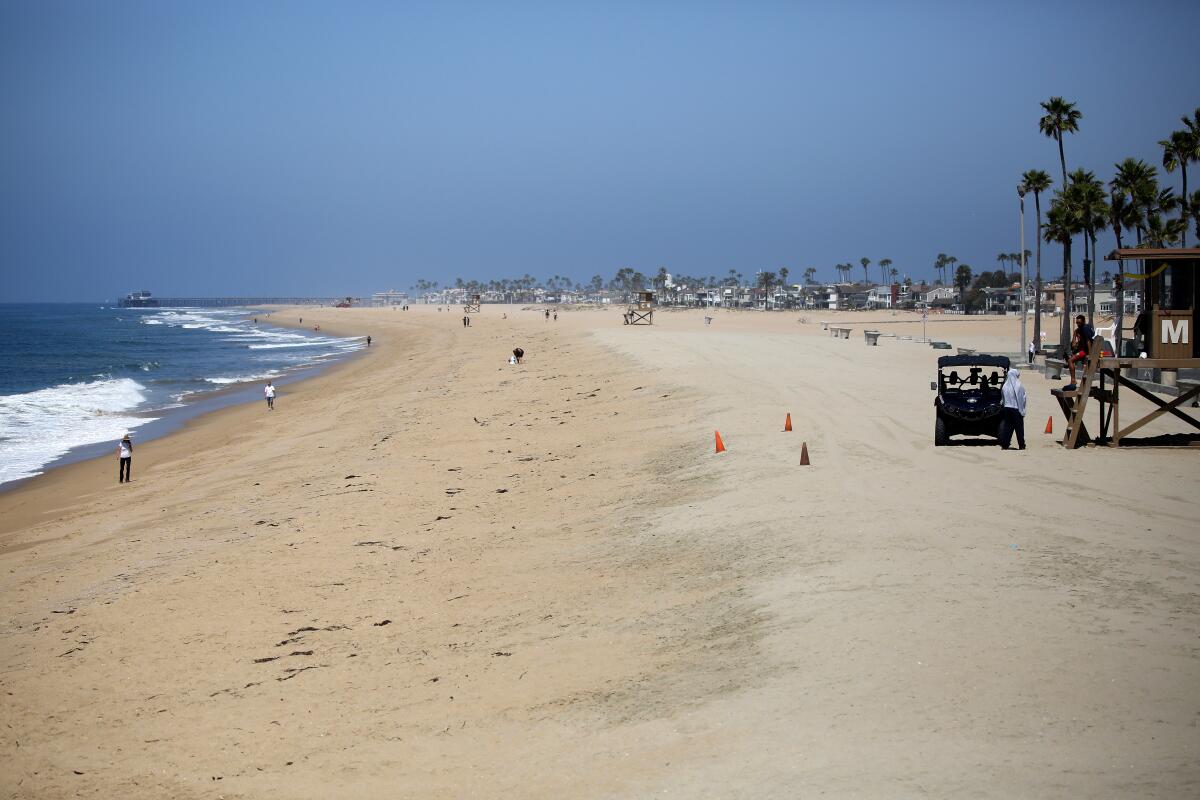Commentary: Responsible use of parks and beaches is reasonable

- Share via
COVID-19 first seemed very lethal, its spread assumed to have started here in late February. Suspension of travel, social distancing and lockdowns ensued by mid- to late-March due to fears of millions of U.S. deaths, hospitals everywhere overwhelmed — a public health cataclysm.
Yet infection control rests on utilitarian principles: The greatest good for the greatest number, not simply saving every single life. We send first responders into life-threatening conditions, we allow driving and even deadly cigarette smoking. Health policy rests on science, which moves with new data.
What we know now: Data newly indicates that undetected cases of the coronavirus spread widely in U.S., starting with millions of travelers from China in late December through March, even before the lockdown. Chinese data show it spreads fastest in close households (including nursing homes) and by mass transit. Outdoor transmission is mitigated by air dilution and as micro-droplets dry out.
Arguably, lockdown of untested positive “carriers” in clusters may have promoted spread in late March and early April and was too late to stop prior to massive spread. Those sheltering at home now represent the most common source of New York City admissions. Responsible use of parks and beaches seems reasonable.
As we reopen responsibly, the past is prologue. Except that in the case of the virus that causes COVID-19, there was no scientific knowledge of it, a truly novel virus — but not a magical one. It still follows the laws of virology, despite its highly communicable properties — enhanced by lack of immunity.
All viral epidemics have a time curve, even the novel flu of 2017 that infected 50 Million and killed an estimated 80,000 in the U.S. As more get infected, the rate of infection slows. Weather is also a factor; more people being outdoors lessens close contact.
COVID-19 has an up to-14-day incubation period from infection to noticeable symptoms. Symptoms are absent in many, thus not detected. A similar additional lag occurs from illness onset to death.
So the first deaths appear up to a month from infection. Rising positive tests, hospitalizations and deaths are thus a trailing marker for current rate of spread. Yet those lagging numbers guided lockdown rationale.
Given the high communicability, with tens of millions infected, even a very small minority who die will add up to a terrible total number.
Most deaths occur in the aged and those with chronic conditions. Under 40, the risk of death is similar to the flu, under 20, it approaches 0 (unlike the flu). Stopping school may lower spread, but that needs proof. It clusters in school kids with more vulnerable adults.
The “greatest good” — and individual life — is harmed by people staying away from medical care for treatment of heart attacks, strokes, acute appendicitis, chronic joint problems where mobility is crucial, pain, even stopping necessary vaccinations for children. The unprecedented economic upheaval, media-fueled fear frenzy and resulting tsunami of anxiety and depression are swamping mental health resources. Mental disorders harm physical health.
Recalibration should take geographic as well as demographic variables into consideration, rather than one-size-fits-all. Federal policy is too autocratic, municipal may be too self-serving.
Small states or counties of very large ones may work best, with constant monitoring of best hygiene and distancing practices, enforcement when needed. America’s independent public will resist unenforceable policy and lower trust in public officials.
One cannot prevent each and every death. Dogmatic policy may promote more personal and socioeconomic harm and deaths than an apolitical but populationally responsible one.
The writer is a physician and a senior medical executive in Newport Beach.
All the latest on Orange County from Orange County.
Get our free TimesOC newsletter.
You may occasionally receive promotional content from the Daily Pilot.





